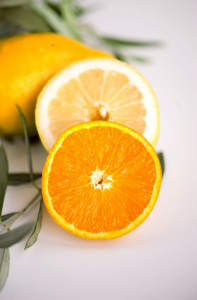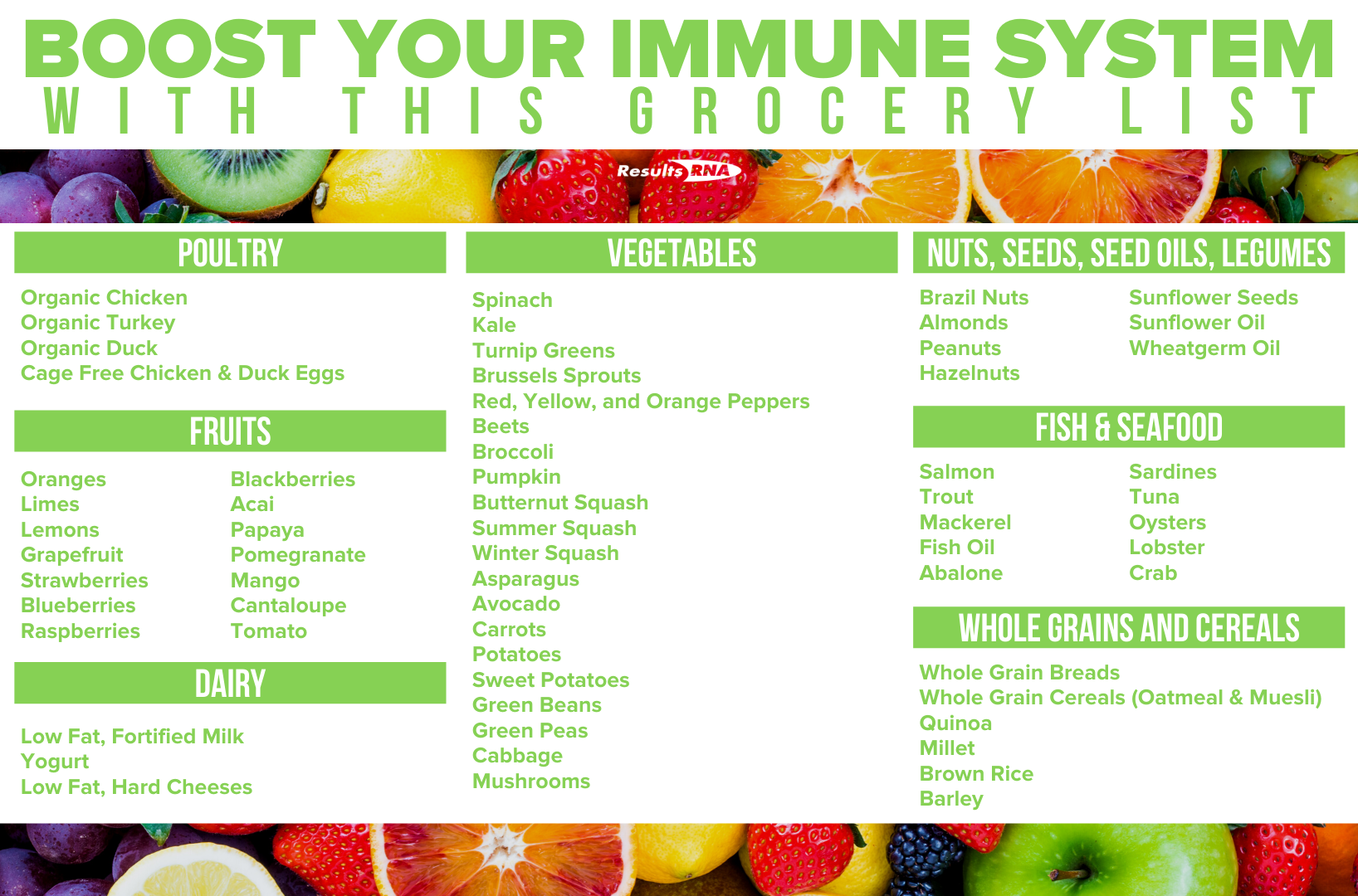Nutrient-rich Foods that Boost Immune Function
During this time of turmoil, people are actively searching for steps they can take to stay healthy; such as handwashing, wearing a mask, avoiding large crowds, and finding nutrient-rich foods that can help boost their immune function. These everyday preventative measures can make all the difference.
There is significant evidence that in addition to being a great preventive measure, nutrition choices can influence immune strength and susceptibility to illness. Let’s explore what nutrients your immune system needs to function properly, which nutrient-rich foods are best for supporting immune function, and which Results RNA supplements we recommend for immune health.
Vitamins and Nutrients Needed for Optimal Immune Function
Research has demonstrated that many nutritious foods, particularly fruits and vegetables, provide a variety of vitamins, minerals, and antioxidants that can boost immune function and help reduce oxidative stress. Increasing our intake of foods containing the important nutrients below may help protect us from immune challenges.
Below, we explore some of these vitamins and nutrients, and which foods to get them from.
Vitamin C
 The importance of vitamin C in human health was first discovered in the 1700s by naval physician, James Lind, who found that sailors suffering from scurvy were cured when given citrus fruits. Dr. Lind did not know what aspect of the fruit was responsible for the cure, as Vitamin C was not identified until much later.
The importance of vitamin C in human health was first discovered in the 1700s by naval physician, James Lind, who found that sailors suffering from scurvy were cured when given citrus fruits. Dr. Lind did not know what aspect of the fruit was responsible for the cure, as Vitamin C was not identified until much later.
Scientists have been debating its impact on human health for decades, but we now know that Vitamin C is a powerful antioxidant that helps to destroy free radicals and support the body’s natural immune response. It plays a vital role in immune cell differentiation, supports the collagen structure of the skin to provide a barrier to infection, and enhances destruction of cells infected with microbial pathogens.
Vitamin C is on the World Health Organization’s List of Essential Medicines, and is vital to the growth and health of bones, teeth, gums, ligaments, and blood vessels. Because humans can’t make Vitamin C due to an enzyme deficiency, we must rely on our diet and dietary supplements to meet adequate intake of this powerful immune-boosting nutrients.
Foods containing significant amounts of vitamin C include red and yellow peppers, tomatoes, potatoes, oranges, lemons, limes, grapefruit, strawberries, mangoes, broccoli, and brussels sprouts.
Vitamin D
The first evidence for the positive effect of vitamin D intake on human health was a result of early studies on rickets and osteomalacia, a softening of the bones. Research over the past few decades demonstrates that Vitamin D has a much wider impact on human health than previously known, especially in the field of human immunology.
In humans, vitamin D is mainly synthesized in the skin after exposure to UVB rays, with only a minor part coming from dietary sources. Dietary intake of vitamin D is highly dependent on individual nutritional habits and the food fortification strategy of the country you live in. Globally, approximately one billion people are vitamin D deficient, while 50 percent of the population has vitamin D insufficiency. Active and native vitamin D, calcitriol and cholecalciferol (also known as 1,25-dihydroxycholecalciferol) are important regulators of both the innate and adaptive immune responses. Vitamin D regulates innate immunity by increased production of antimicrobial substances and subsequent killing of bacteria.
Vitamin D also regulates adaptive immunity to minimize inflammation and autoimmune challenges. There are not very many foods that naturally contain Vitamin D. The flesh of fatty fish (such as salmon, tuna, and mackerel) and fish liver oils are among the best sources. Small amounts of vitamin D are found in beef liver, cheese, and egg yolks.
Most of the vitamin D in the American diet comes from fortified foods. In the USA and Canada, milk is fortified with Vitamin D. Breakfast cereals, orange juice, and yogurt are other Vitamin D fortified foods.
Glutathione
Glutathione (GSH) is the most abundant and powerful antioxidant in our body and a critical regulator of oxidative stress. It has many important functions in the human body, including protecting macromolecules from oxidative damage, detoxifying drugs, and maintaining optimal immune function. GSH depletion has numerous detrimental effects, including impaired immune function and increased oxidative stress.
There are a handful of foods that naturally contain glutathione, including asparagus, avocado, green beans, spinach, cabbage, Brussels sprouts, broccoli, garlic, tomatoes, cucumber, mango, papaya, almonds, and walnuts. To maximize the glutathione available from these foods, it’s best to eat them raw as cooking reduces the glutathione content. Increasing glutathione intake to support optimal immune function can also be accomplished by taking dietary supplements in the form of reduced glutathione, or S-acetyl-glutathione – an even more well-absorbed form.
Zinc
Zinc deficiency first became evident in the 1960s and thereafter it quickly became clear that zinc is essential for effective immune function. Zinc deficiency is more common than most think, with approximately 30 percent of the elderly population being deficient.
Zinc ions are key to regulating signaling in both innate and adaptive immune cells. Zinc’s anti-inflammatory and antioxidant properties have been documented for many years, although its role in the immune system has not been fully defined. Links between altered zinc homeostasis and diminished health are extensive, particularly in the elderly.
In humans, signs of zinc deficiency may include weight loss, growth retardation, and immune dysfunction. Consequently, the benefits of zinc supplementation for a malfunctioning immune system have become clear and are well-supported by clinical research.
The Food and Drug Administration has approved zinc supplementation for the treatment of a number of disorders. Zinc is also part of nutrient therapy for those with autoimmune disorders. The best dietary sources of zinc are shellfish (oysters, crab, and lobster), red meat, pork, poultry, beans, and nuts.
Additional, Well Researched Immune-Boosting Nutrients
Andrographis paniculata:
Andrographis paniculata (family Acanthaceae) is a popular medicinal plant whose constituents have been used traditionally for an array of upper respiratory conditions.
N-Acetyl-Cysteine (NAC):
N-acetyl-L-cysteine (NAC) has been shown to possess powerful antioxidant activity and decrease viral load and replication. NAC also diminished the release of inflammatory cytokines and apoptotic mediators.
Beta 1,3 Glucan:
Glucans are a group of linked glucose carbohydrates that are also known to be biologically active immunomodulators or biological response modifiers. The strong immunostimulating potential of β-glucans has been well established.
Sambucus nigra (Elderberry):
Research in animal models has shown Sambucus nigra L. extract (elderberry juice) suppresses viral replication, modulates serum antibody levels, and raises secretory IgA levels, demonstrating an immune-stimulating response.
Grifolia frondosa (Maitake Mushroom):
Maitake mushrooms (Grifola frondosa) are popular in Asia for immune-stimulating properties and research supports these benefits.
Lentinula edodes (Shiitake Mushroom):
Clinical research has demonstrated that consuming Shiitake (Lentinula edodes) mushrooms daily improves cell effector function and increases secretory IgA, suggesting improved gut immunity. Shiitake mushroom consumption also improved C-Reactive Protein levels and cytokine profiles, suggesting a decrease in inflammation and an overall enhanced immune response.

Building a Nutritious, Immune-boosting Grocery List
Fruits
- Citrus fruits (orange, lemons, limes, grapefruit)
- Berries (strawberries, blueberries, raspberries, blackberries, Acai)
- Other Fruit (papaya, pomegranate, mango, cantaloupe, tomato)
Vegetables
- Spinach
- Kale
- Turnip greens
- Brussels sprouts
- Red, yellow, orange peppers
- Beets
- Broccoli
- Pumpkin
- Butternut, summer, winter squashes
- Asparagus
- Avocado
- Carrots
- Potatoes
- Sweet potatoes
- Green beans
- Green peas
- Cabbage
- Mushrooms
Whole Grains and Cereals
- Whole grain breads
- Whole grain cereals (oatmeal, muesli, etc.)
- Quinoa
- Millet
- Brown rice
- Barley
Fish and Seafood
- Salmon
- Trout
- Mackerel
- Fish Oil
- Abalone
- Sardines
- Tuna
- Oysters
- Lobster
- Crab
Poultry and Eggs
- Chicken – organic
- Turkey – organic
- Duck – organic
- Chicken and Duck Eggs – cage free, vegetarian fed
Dairy Products
- Milk – low fat, fortified
- Yogurt
- Cheese – low fat, hard cheeses
Nuts, Seeds, Seed Oils, Legumes
- Brazil nuts
- Almonds
- Peanuts
- Hazelnuts
- Sunflower seeds
- Sunflower oil
- Wheatgerm oil
Nutrient-Rich Foods to Boost Immune Function
Now that we have identified the mechanisms and roles for several key nutrients that can support an optimal immune response, let’s match these nutrients to the food groups they can be found in.
Citrus Fruits, Berries, Pit Fruits, and Fruit Juice
- Vitamin C
- Antioxidants
- Vitamin D (fortified)
- Vitamin B
Vegetables (leafy green, orange, yellow, red vegetables, cruciferous, root vegetables, beans)
- Vitamin C
- Glutathione
- Vitamin B
Whole Grains and Cereals
- Vitamin D (fortified)
- Antioxidants
- Vitamin B
Fish, Fish Oils, and Seafood
- Vitamin D
- Vitamin A
- Iron
- Zinc
- Vitamin B
Poultry and Eggs
- Vitamin D
- Iron
- Zinc
Dairy Foods
- Vitamin D
Nuts, Seeds, Legumes, Seed Oils
- Glutathione
- Iron
- Zinc
- Vitamin B









